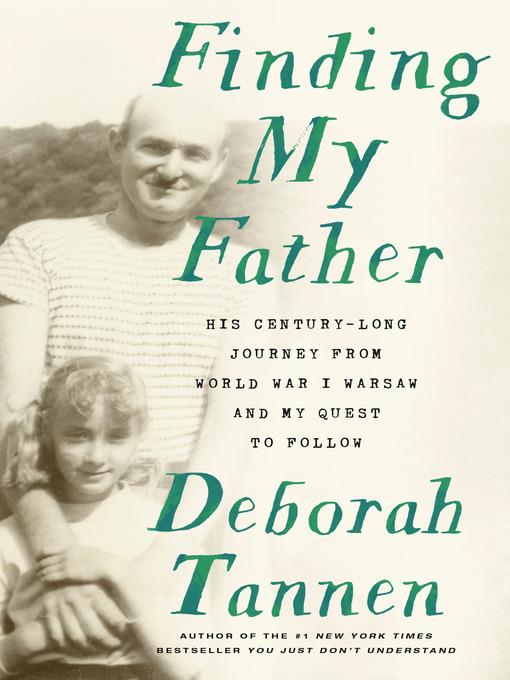
Finding My Father
His Century-Long Journey from World War I Warsaw--and My Quest to Follow
کتاب های مرتبط
- اطلاعات
- نقد و بررسی
- دیدگاه کاربران
نقد و بررسی

June 29, 2020
Tannen (You Just Don’t Understand) examines the life of her father in this passionate memoir. A giant in her life (“he’s the parent I felt an affinity with, the one who understood me”), Eli Tannen possessed an even temper that masked an unhappy past. He emigrated from Poland to New York City in 1920 and quit school at 14 to support his mother and sister. He eventually went to college and earned a law degree during the Depression, but couldn’t find work as a lawyer for nearly 30 years, when he started a legal practice in support of worker’s compensation. To support his wife (who thought he was ugly and grew to dislike him) and family, he held various jobs, including as a prison guard and garment cutter. He was a prolific letter writer; Tannen notes, “my inclination to write traced to my father.” From him she “learned to listen for unspoken meanings in people’s conversations.” While visiting him in her parents’ Westchester condo, she uncovers letters detailing her father’s relationship with another woman just before his marriage. She then speculates what his life might have been, concluding, “She was better suited to my father... a kind, compassionate intellectual.” Tannen’s readers will appreciate this tender-hearted paean to her father.

July 15, 2020
A devoted daughter pays homage to an extraordinary man. Drawing on abundant sources, sociolinguist Tannen creates a loving biography of her father, Eli Samuel Tannen, who indelibly shaped her life. She took on the project, she writes, "because he bequeathed his words to me--all the words he wrote and saved; all the letters and documents and cards and notes that he gathered and held on to; all the stories he remembered, wrote down, and told me; and the hours upon hours of conversations we had when he was old." Arriving in the U.S. from Poland when he was 12, he soon became the breadwinner for his mother and sister after his father died. Although his mother wanted him to finish high school, he dropped out and studied law "because it was the only profession he could pursue at night." In 1933, though, when he passed the bar, the Depression closed off opportunities to practice. His list of 68 jobs represents "a summary of his adult life" and "his pride in doing whatever he could--whatever he had to do--to support his family." In 1958, he finally established his own law firm, specializing in workers' compensation. Including eloquent passages from her father's writings, Tannen relates his vivid memories of his childhood in Warsaw, portrayals of his accomplished aunts (one was Einstein's student and lover), his fervent identification as a Jew, and his early idealistic membership in the Communist Party, which generated a thick FBI file. The author digs deeply into her parents' relationship, concluding that their marriage resulted from "the inevitable interplay of two young people thrown together by circumstance; the temptations of sex (for him); the desire to marry (for her); and the scaling back of great, often unrealistic expectations by circumscribed opportunities." Her brilliant, resolute father, Tannen amply shows, was worthy of her undying admiration. A generous and empathetic portrait.
COPYRIGHT(2020) Kirkus Reviews, ALL RIGHTS RESERVED.

August 14, 2020
In this latest work, Tannen (linguistics, Georgetown Univ.; You Just Don't Understand: Women and Men in Conversation) deviates from her usual linguistic focus to the more personal subject of her own family and the father she adored. Tannen wrote this memoir after years of faithfully compiling memories gleaned from the journals of her father, Eli Tannen, as well as collecting talks and recorded conversations between her and her father over an extended period of time. Tannen reflects on developing a love of writing, language, and literature because of her father's influence. She also considers what it means to be Jewish in the United States, and to be descended from Yiddish-speaking Orthodox Jewish communities in Europe. Chapters on Eli's childhood in the Hasidic Jewish section of Warsaw in the early 1900s are as fascinating as the impressive recollections of his aunts and uncles, who add further context to family memories. While segments on Eli's personal and intimate life feel oddly tangential in the scheme of the overall narrative, early chapters provide historical context and valuable insight into Jewish lives during the height of Nazi Germany. VERDICT An uneven biography, but a worthy addition to World War II and Holocaust memoirs.--Stacy Shaw, Denver
Copyright 2020 Library Journal, LLC Used with permission.

January 1, 2020
Having enjoyed countless hours as a child with her storytelling father, clearly inspiration for her career in linguistics, Tannen (You Just Don't Understand) used a journal he willed to her to reconstruct a rich life that began in Warsaw's Hasidic community in 1908 and ended with his deep involvement in New York politics. Personal impact, too, and a look at the very act of remembering.
Copyright 2020 Library Journal, LLC Used with permission.

























دیدگاه کاربران